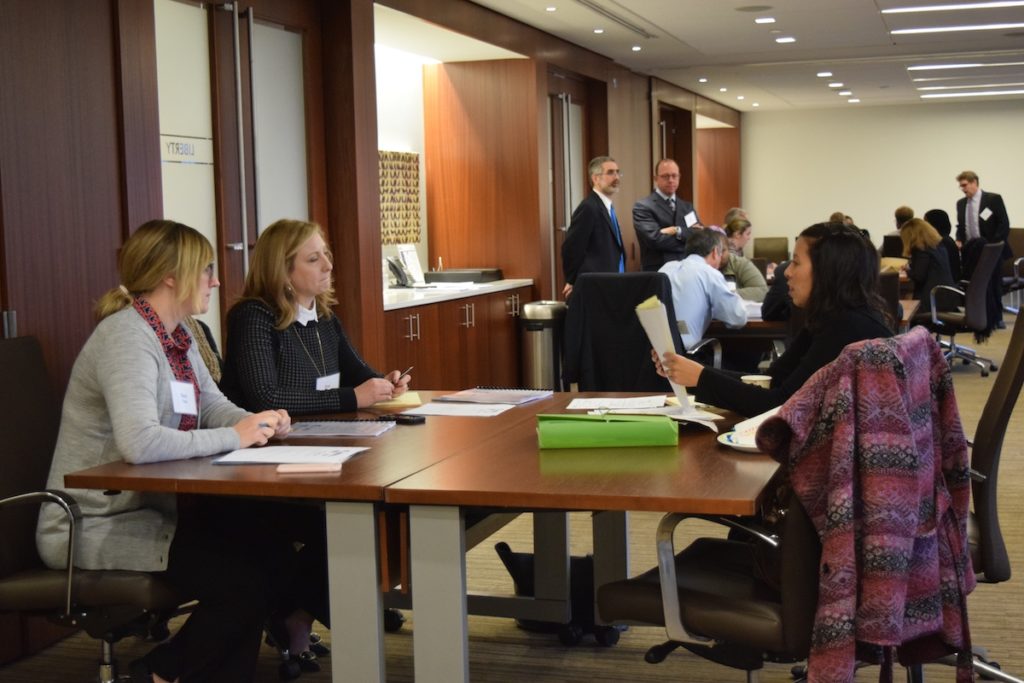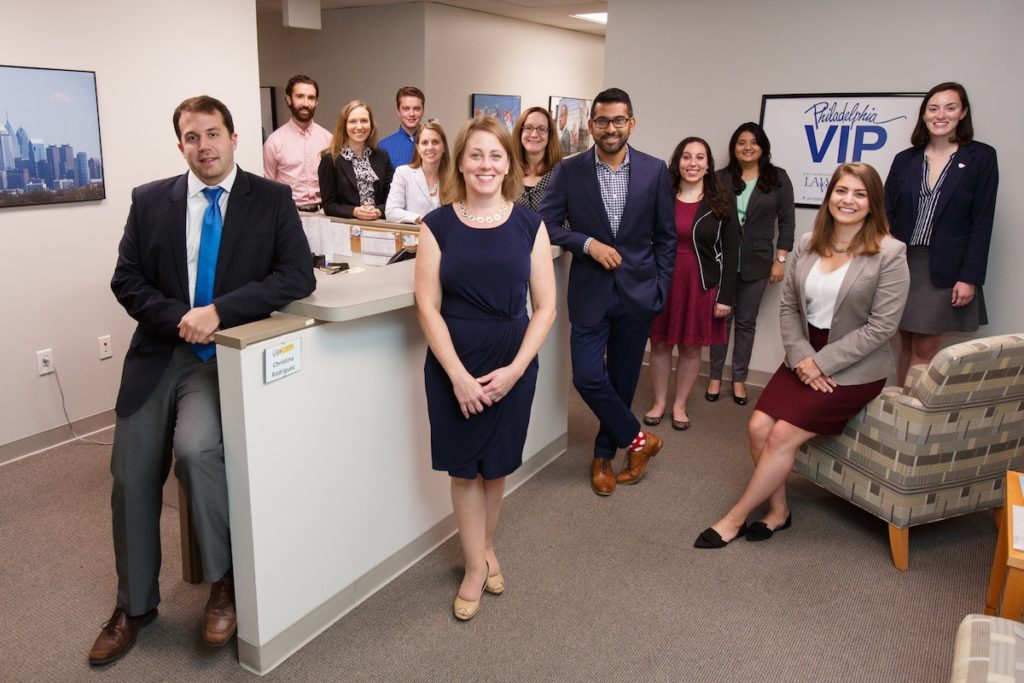Why Sara Woods is leaving Philadelphia VIP for the education world
 February 13, 2017
Category: Featured, Long, People, Q&A
February 13, 2017
Category: Featured, Long, People, Q&A
“Moving On” is a series of Q&As with social impact leaders who are leaving their organizations for new opportunities. Here, they share what they learned and where they’re headed.
Sara Woods’ transition to college access and success nonprofit Philadelphia Futures is more of a return than a departure.
The outgoing executive director of Philadelphia VIP, the legal services nonprofit that connects volunteer lawyers with low-income Philadelphians, has spent much of her career in education as both a law professor and a mentor. Serving low-income students — and hopefully preventing them from ever needing to access VIP’s services — is a natural next step for her.
“It feels great to come into an organization that is so well-run, that has wonderful, amazing outcomes, that is really at the top of it’s game,” Woods said in her “Moving On” interview with Generocity Editor Julie Zeglen. “We can only go further.”
The conversation has been edited and condensed.
Generocity: Why are you making this move?
Sara Woods: I feel passionately about giving folks a leg up for self-sufficiency. That’s been the theme throughout my career. I’ve been doing that for nine years at Philadelphia VIP and I adore the work and would have kept doing it, but when an opportunity presents itself like Philadelphia Futures, you say yes. So I did!
It also gets me back to my roots in education and particularly with students, which I’m excited about. It’s really attacking the problem of poverty, right? How to escape poverty, hopefully on the preventative side, as opposed to VIP, which is reactionary. If you can get students early on who can get a college degree, you hope they never get to VIP.
"If you can get students early on who can get a college degree, you hope they never get to VIP."
G: Can you talk a bit about your education background?
SW: I’ve always had some foot in the door with education, whether it’s through mentoring or teaching. I’ve been teaching for the last 10 years at Villanova Law School, and before I got to VIP I did career counseling and ran a pro bono program at Villanova. My mom was a teacher. There’s a theme.
G: What are some wins from your time at Philly VIP?
SW: It has definitely been a group effort over the last nine years, and because of that teamwork we have accomplished some major wins, [such as] increasing the number of people we’ve served, and we’ve done that through investments in staff and other resources. We are now a staff of 16 and were 11 when I first started. We have a budget at $1.3 million as opposed to $600,000 when I first started. And it’s not growth for growth’s sake — it was intentional and thoughtful growth to be sure we were serving as many clients as possible.
And the other win is really the unique space VIP holds in the legal services community. We’re the only nonprofit that leverages the power of legal volunteers as [the basis of our] work. That means that we can serve more people, it also frees up resources for our direct-service provider colleagues, and it provides opportunities for lawyers to use their skills to open the gates of justice.
G: How do people get involved in the program? Do you recruit lawyers or is there a huge amount of lawyers laying in wait to volunteer?
SW: I wish! [Laughs] That’s the goal, right? Our constant job is recruiting, onboarding, training and stewarding volunteers, because our gold-star volunteers are folks who come back case after case after case. Our job is to make sure we’re always out there promoting the opportunities to volunteer with VIP. We have staff lawyers as well as pro bono case managers who are there to provide technical assistance for volunteers, we have expert training — all of the resources to make it a good experience, and also make sure that folks come back. We are out there every day trying to get new volunteers and keep the ones that we have.
G: Do you have any best practices for that? I imagine that volunteer retention is something that a lot of nonprofits struggle with.
SW: It is, and we decided to take a data-focused view of it. Five years ago, we took a look at our retention data — who’s coming back, what are the demographics of our superstar volunteers, and when do we lose the most people? As a result, we found where our tipping point was: getting people from one to two cases. So we focused a lot of our retention efforts around people who were finishing their first case, making sure that we’re doing as much outreach as possible for them to have a good experience, but also so that we’re getting them right at the end and saying, “How about your next case?” because if they take that next case, then they’re [nearly] 60 percent more likely to take their third case.
But it’s a very personal, time-intensive process of just checking in with volunteers, making sure they have what they need, saying thank you and doing a lot of appreciation — both quietly and publicly.
G: At Generocity, we’ve covered Philadelphia Futures a ton over the years. I did a “Moving On” interview with Joan. What is it like, going into an organization that has been around for so long and has such notoriety, and also has such a beloved outgoing executive director?
SW: Gosh, I wouldn’t want it any other way. It feels great to come into an organization that is so well-run, that has wonderful, amazing outcomes, that is really at the top of it’s game. We can only go further.
G: Are there any specific initiatives or actions you already have in mind for Philadelphia Futures?
SW: I think that my first job is really to listen, get to know the staff and the board, and our students — to figure out what their wants and desires are. I certainly have my own ideas, but I think it’s critical to be well-informed before making those decisions.
My first priority is to keep doing what we’re doing and to do it really, really well, to make sure that we’re communicating that to all of our stakeholders, and then ideally, my goal — and I think the goal of the board and staff — is always to serve more students.
"It's my job as a leader to make sure their voices are heard."
G: Your point about listening first is so important in leadership. Are there other specific things you’ve learned in the last nine years of leading Philly VIP that you think has helped you get to this point?
SW: One thing is communication, and I think that’s bigger than just listening. Listening to staff, empowering staff, the board, stakeholders, being transparent, and making sure that we encourage everyone to share their voice. There are many folks on VIP staff and I’m sure at Futures where it might not be their nature to speak up in a group setting, and it’s my job as a leader to make sure their voices are heard.
The other piece of this, I’m a quote-unquote “come with me” leader. I think I’m very clear about what the end goal is, and I spend a lot of time in the hiring process to make sure that folks are on board with that end vision, and then empower folks to go do it. You hire good folks and let them go! And if you make a mistake, you make a mistake.
That’s where innovation comes out. That’s where you can find new, interesting ways of doing things — and you’ve gotta sometimes fail.
G: Is there anything else you’d like to share?
SW: I think it’s important for folks to know that organizations succeed not just because of the executive director, but because of a team of people, and I’ve been incredibly blessed to have an amazing team at VIP, and that include staff, board and our volunteers. And I understand from Joan and the folks I’ve already met through Futures that that also exists at Futures. I cannot wait to get to know that team and work toward our really, really critical goal of getting low-income, first-generation students to college and succeeding in college.
Project
Philadelphia VIP Legal ClinicTrending News











